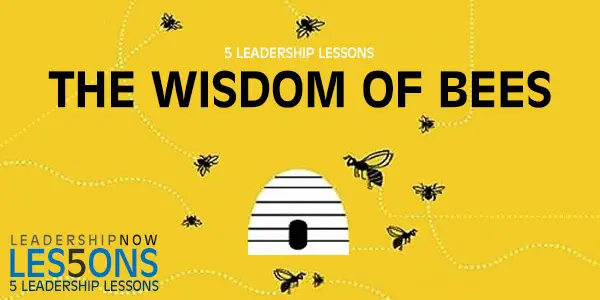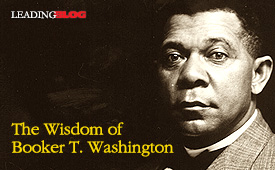5 Leadership Lessons: The Wisdom of Bees

 WHEN talking about wisdom, bees often come up. Aristotle, Marcus Aurelius and Emerson all spoke about bees. And for good reason. They have a lot to teach us. Beekeeper, management consultant and professor, Michael O’Malley, has extracted 25 lessons for leaders in The Wisdom of Bees. Here are five:
WHEN talking about wisdom, bees often come up. Aristotle, Marcus Aurelius and Emerson all spoke about bees. And for good reason. They have a lot to teach us. Beekeeper, management consultant and professor, Michael O’Malley, has extracted 25 lessons for leaders in The Wisdom of Bees. Here are five:
 Protect the Future. Bees don’t focus exclusively on the most productive flower patches at any given time, and for good reason. Conditions change rapidly for bees and they can ill afford wide swings in pollen and nectar intake….When a lucrative vein of nectar is discovered, the entire colony doesn’t rush off to mine it no matter how enriching the short-term benefits. The colony has internalized a very important natural rule: someday the nectar in that location will stop flowing and they need to be prepared to rapidly reallocate resources to other productive sites. The best way to ensure that there will be a short run is to focus on the long run….As the bees clearly advise through their behavior, overexploiting a rich patch just because it is there is a death trap.
Protect the Future. Bees don’t focus exclusively on the most productive flower patches at any given time, and for good reason. Conditions change rapidly for bees and they can ill afford wide swings in pollen and nectar intake….When a lucrative vein of nectar is discovered, the entire colony doesn’t rush off to mine it no matter how enriching the short-term benefits. The colony has internalized a very important natural rule: someday the nectar in that location will stop flowing and they need to be prepared to rapidly reallocate resources to other productive sites. The best way to ensure that there will be a short run is to focus on the long run….As the bees clearly advise through their behavior, overexploiting a rich patch just because it is there is a death trap.
 Distribute Authority. With many thousands of employed workers, the queen couldn’t possibly direct all of the actions in the field from her command post.…While the queen is the generic heart and soul of the hive, she is by no means the only leader….Those closest to the information should make the relevant decision. Decentralization is one of the hallmarks of the honeybee colony. Foraging decisions, for example, are made by the foragers. The information doesn’t travel up to the queen and back again. If you are thinking of shifting greater power away from the organizational core and into the field, however, consider these facts first: 1) bees have clear objectives; 2) they are excellent communicators and are able to quickly take in and consolidate information—and transform that information into coordinated action; and 3) they are reliable workers that are very good at what they do.
Distribute Authority. With many thousands of employed workers, the queen couldn’t possibly direct all of the actions in the field from her command post.…While the queen is the generic heart and soul of the hive, she is by no means the only leader….Those closest to the information should make the relevant decision. Decentralization is one of the hallmarks of the honeybee colony. Foraging decisions, for example, are made by the foragers. The information doesn’t travel up to the queen and back again. If you are thinking of shifting greater power away from the organizational core and into the field, however, consider these facts first: 1) bees have clear objectives; 2) they are excellent communicators and are able to quickly take in and consolidate information—and transform that information into coordinated action; and 3) they are reliable workers that are very good at what they do.

 Order and Innovate Through Fuzzy Constants. Much of the activity of bees is calibrated to constants that allow them to find their way home. When an organization adopts and fastens itself to a few immutable principles, the system as a whole becomes more reliable. A degree of error in the form of initiative, original thinking, and experimentation can then be tolerated. Constants do not drive out originality; they make it possible.…Where several solutions exist in shifting, complex settings, organizations require the intrusion of some variability—but never to the point of disorder.
Order and Innovate Through Fuzzy Constants. Much of the activity of bees is calibrated to constants that allow them to find their way home. When an organization adopts and fastens itself to a few immutable principles, the system as a whole becomes more reliable. A degree of error in the form of initiative, original thinking, and experimentation can then be tolerated. Constants do not drive out originality; they make it possible.…Where several solutions exist in shifting, complex settings, organizations require the intrusion of some variability—but never to the point of disorder.
 Keep Your Balance. One of the principle ways that bees moderate extreme behaviors is through genetic diversity….This genetic diversity produces bees within the same hives that are differentially sensitive to environmental conditions. For example, bees keep the temperature of the hive relatively constant at about ninety-three degrees Fahrenheit….The bees heat the hive by contracting two sets of flight muscles and cool the hive by flapping their wings. However, they don’t do this all at the same time….Fortunately, the bees differ in their sensitivity to temperature and alter their behavior at different times in response to climatic conditions….Managers should strive to hire capable people who, as a group, provide the team with a range of perspectives and worldviews. Otherwise, organizations can become closed societies. In addition to making a conscious effort to hire in a fair-minded way, take time to select people who are naturally inquisitive and who have varied interests.
Keep Your Balance. One of the principle ways that bees moderate extreme behaviors is through genetic diversity….This genetic diversity produces bees within the same hives that are differentially sensitive to environmental conditions. For example, bees keep the temperature of the hive relatively constant at about ninety-three degrees Fahrenheit….The bees heat the hive by contracting two sets of flight muscles and cool the hive by flapping their wings. However, they don’t do this all at the same time….Fortunately, the bees differ in their sensitivity to temperature and alter their behavior at different times in response to climatic conditions….Managers should strive to hire capable people who, as a group, provide the team with a range of perspectives and worldviews. Otherwise, organizations can become closed societies. In addition to making a conscious effort to hire in a fair-minded way, take time to select people who are naturally inquisitive and who have varied interests.
 Prepare For Leadership Changes. A colony headed by a high-quality queen has a more robust worker population and greater honey yield. It matters a great deal who is at the top. Consequently, it is not surprising that the workers in the hive pay close attention to the queen’s ability to propagate and are sensitive to declines in her performance. The queen’s ability to lead is determined ultimately by the minions, a truth unfortunately lost in many organizations. Leadership depends on the consent of the people to follow. In the instance of bees, the voice of workers is loud and clear….If the honeybee teaches us anything, it is that organizations cannot survive without a leader and, therefore, the colony prevents costly voids in leadership by planning for successors in advance of the obvious need. Colonies die without their top bee; organizations become pathological sans leadership.
Prepare For Leadership Changes. A colony headed by a high-quality queen has a more robust worker population and greater honey yield. It matters a great deal who is at the top. Consequently, it is not surprising that the workers in the hive pay close attention to the queen’s ability to propagate and are sensitive to declines in her performance. The queen’s ability to lead is determined ultimately by the minions, a truth unfortunately lost in many organizations. Leadership depends on the consent of the people to follow. In the instance of bees, the voice of workers is loud and clear….If the honeybee teaches us anything, it is that organizations cannot survive without a leader and, therefore, the colony prevents costly voids in leadership by planning for successors in advance of the obvious need. Colonies die without their top bee; organizations become pathological sans leadership.
"As you look for ways to improve your organization,” says O’Malley, “it would not be outlandish to take a step back and ask yourself, What would a bee do?"
* * *

Like us on
Instagram and
Facebook for additional leadership and personal development ideas.
* * *



Posted by Michael McKinney at 09:41 AM
Permalink
| Comments (0)
| This post is about Five Lessons











